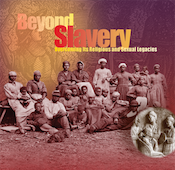Beyond Slavery
Explore the Conference
Explore the Conference by Subject
Slavery in Christian, Jewish, and Muslim Scripture and Religious Law
Christianity, Religion of the Slaveholders and the Enslaved
Sexual Assault and Exploitation Under U.S. Slavery and Jim Crow
How Slavery Has Shaped Our Understandings of Marriage and Friendship
Slavery, Violence, and the State
Beyond Slavery:
Overcoming Its Religious
& Sexual Legacy
Mende Nazer:
A Formerly Enslaved Woman Responds to the History of Slavery and to Religious Teachings on It
I am one of the very few who has escaped slavery and been able to tell what it means to be a slave. I now know that slavery leaves you with a shadow for the rest of your life. In my experience, slavery is not only about physical abuse, verbal abuse, and sexual abuse: my masters even tried to take my identity away-they called me by a curse name instead of by my name. Even the children I thought were innocent called me by that word. Not by my name, Mende. No one can understand slavery if they have not experienced it, but listening to those who have experienced slavery can help people begin to be aware of what an atrocity slavery is and has always been. Slavery is never moral, but religious leaders have said that it can be moral. People who say that their religion's form of slavery is not harsh are trying to cover up the real situation. Before working on this project, I did not know that the Qur'an allows slavery. It was shocking to me. Praying five times a day is the foundation of my life. My masters tried to keep me from praying, but prayer was the only moment when I could be alone and speak to my God. I felt held by God. Like the Qur'an, the Bible allows slavery. There is a contradiction between seeing the Bible as an absolute guide and recognizing that slavery is always immoral. I am told that most religions today do not support slavery, but I ask, "What does that mean exactly? That they are denying that it exists?" If you oppose slavery, you should work to stop it. I call upon scholars of Islam, Judaism, and Christianity not only to examine the treatment of slavery in religious texts, but also to find religious solutions to these texts' toleration of slavery.
This video was recorded on October 15-16, 2006 as part of the conference, "Beyond Slavery: Overcoming Its Religious and Sexual Legacy." It was sponsored by the Feminist Sexual Ethics Project in the Near Eastern and Judaic Studies Department at Brandeis University.
